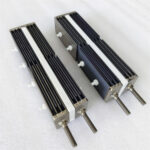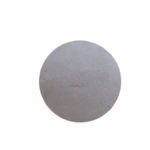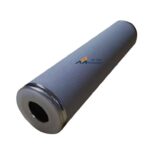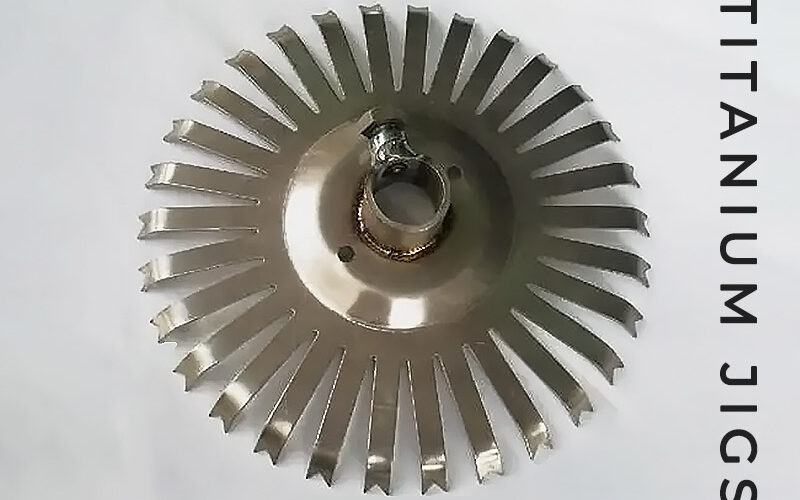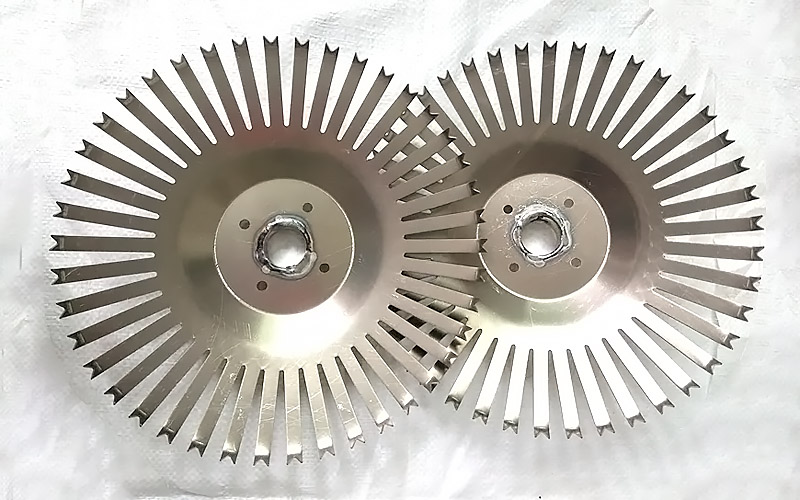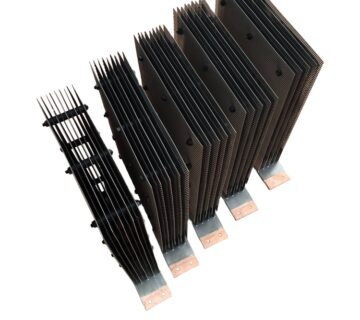Titanium jig is an anodized fixture made of elastic titanium plate. Titanium is a strong, lightweight metal with excellent durability and corrosion resistance. Titanium jig are commonly used in a variety of industries for holding, guiding, or positioning objects during manufacturing processes, assembly operations, or testing.
The Application of Titanium Jig in Anodizing
- Firstly, their excellent corrosion resistance ensures that the jigs themselves do not deteriorate or react adversely during the anodizing process. This helps maintain the integrity and stability of the jig structure over multiple uses.
For example, in the anodizing of aluminium components, titanium alloy jigs can securely hold the workpieces without being affected by the electrolytic solutions commonly used in the process. - Secondly, the strength of titanium alloys allows the jig to withstand the mechanical stresses and forces involved in handling and positioning the parts during anodizing. This prevents deformation or failure of the jigs, ensuring consistent and reliable processing.
- Moreover, the lightweight nature of titanium alloys makes it easier to manipulate and handle the jigs, especially in setups where frequent movement or repositioning is required.
The combination of corrosion resistance, strength, and lightweight properties makes titanium jig an ideal choice for achieving efficient and high-quality anodizing processes in various industries.
How Titanium Jig Enhance the Quality and Efficiency of Anodizing
- Uniform Contact and Current Distribution: The precise design and construction of Titanium Jig ensure uniform contact with the workpiece.
This leads to a more even distribution of electrical current during anodizing, resulting in a uniform oxide layer thickness and improved surface finish.
For instance, in the anodizing of complex-shaped parts, a well-designed jig can prevent areas of low or excessive current density, reducing the occurrence of defects like uneven color or thickness. - Reduced Contamination: Titanium inert nature means it is less likely to introduce impurities or contaminants into the anodizing bath.
This helps maintain the purity of the electrolyte solution and reduces the risk of defects or impurities in the anodized layer. - Enhanced Stability and Durability: The strength and durability of titanium alloys enable the jigs to withstand the rigors of the anodizing process over an extended period.
They do not deform or wear easily, ensuring consistent performance and reducing the need for frequent jig replacements.
This leads to fewer interruptions in the production process and increased overall efficiency. - Precise Positioning and Alignment: Titanium Jig can be engineered to hold the workpieces precisely in the desired position and orientation.
This ensures that the anodizing process is carried out accurately, minimizing errors and rework. - Improved Heat Dissipation: In some anodizing processes where heat is generated, the good thermal conductivity of titanium alloys helps dissipate heat more effectively.
This helps maintain a stable processing temperature, which is crucial for achieving consistent anodizing quality. - Easy Maintenance and Cleaning: The smooth surface of Titanium Jig makes them relatively easy to clean and maintain.
This helps prevent the accumulation of residues or contaminants that could affect the anodizing quality in subsequent runs.
Company profile
Qixin titanium Co.Ltd, is a leading manufacturer specializing in coated titanium anode. With an extensive historyand a wealth of expertise, we have been dedicated to providing high-quality products and solutions to variousindustries for many years.Our company was established 2006, and since then, we have accumulated 18 years of valuable manufacturingexperience. This experience has enabled us to master the art and science of producing top-notch coated titaniumanodes that meet the most stringent quality standards.We take pride in our state-of-the -art manufacturing facilities and a team of highly skilled professionals. Ourengineers and technicians are experts in the field, constantly researching and innovating to improve our productsand processes.
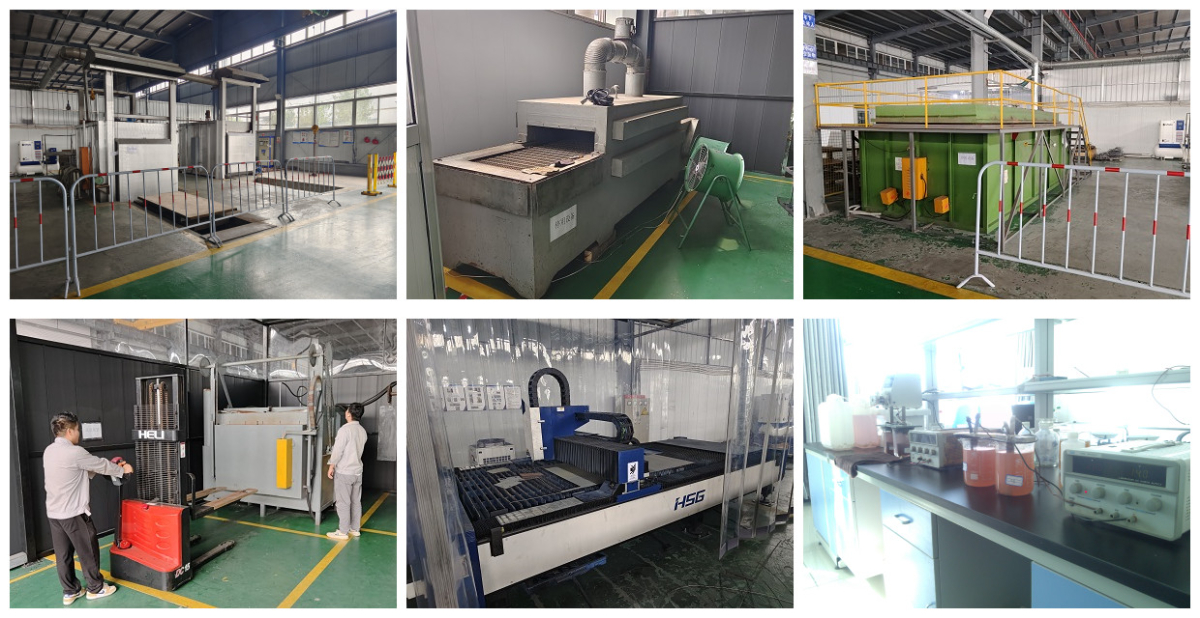
Why choose us?
1. Superior Material Quality & Durability
Corrosion Resistance: Titanium’s inherent resistance to acids, alkalis, and chloride-rich environments ensures long service life in demanding applications like cobalt electrowinning or wastewater treatment.
High Strength & Stability: Titanium maintains structural integrity under high currents and temperatures, reducing the risk of deformation or degradation.
Customized Coatings: We apply advanced oxide coatings (e.g., ruthenium, iridium, platinum group metals) tailored to your process, enhancing conductivity, catalytic activity, and longevity.
2. Technical Expertise & Custom Solutions
Tailored Design: We analyze your process parameters (current density, electrolyte composition, temperature) to design anodes that maximize efficiency.
R&D-Driven Innovation: Our team stays ahead of industry trends, integrating the latest coating technologies (e.g., mixed metal oxides, dimensionally stable anodes – DSAs) for performance gains.
Testing & Validation: Pre-production prototypes undergo rigorous testing to ensure compliance with your specifications.
3. Cost-Effectiveness & Sustainability
Lower Total Cost of Ownership (TCO):
Longevity reduces replacement frequency compared to traditional anodes (e.g., lead, graphite).
Energy-efficient designs cut electricity costs in large-scale operations.
Eco-Friendly: Titanium is recyclable, and our coatings minimize metal leaching, aligning with environmental regulations.
4. Reliable Service & Support
Global Supply Chain: Timely delivery through the streamlined manufacturing and logistics network.
Technical Support: Post-installation guidance, troubleshooting, and maintenance recommendations.
Compliance Assurance: Anodes meet international standards (e.g., ISO, SGS) and can be certified for specific industries (e.g., mining, water treatment).

FAQ
1. How to ensure the product quality?
All products make 100% inspection before shipment also we can provide the MTC Material Test Certification.
2. Can you print our Logo on the products?
Sure, and we welcome the customerized products.
3.What about the payment terms?.
T/T, L/C, Paypal, Western Union, Escrew and MoneyGram etc are all accepted.
4.What is the necessary information for an inquiry?
Product name, specification, material grade and quantity.
5.Can we get a free sample before cargo production?
Sure.
Our Happy Clients

